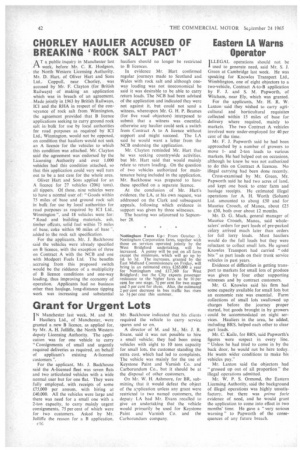A T a public inquiry in Manchester last week, before Mr.
Page 44

If you've noticed an error in this article please click here to report it so we can fix it.
C. R. I-lodgson, the North Western Licensing Authority. Mr. D. Hart. of Oliver Hart and Sons Ltd., Coppull, near Chorley, was accused by Mr. F. Clayton (for British Railways) of making an application which was in breach of an agreement. Made jointly in 1963 by British Railways, ICI and the RHA in respect of the conveyance of rock salt from Winnington, the agreement provided that B licence applications seeking to carry ground rock salt in bulk for use by local authorities for road purposes as required by 1CI Ltd., Winnington, would not be opposed, on condition that hauliers would not seek an A licence for the vehicles to which this condition was attached. Mr. Clayton said the agreement was endorsed by the Licensing Authority and over 1.000 vehicles had this condition attached, so that this application could very well turn out to be a test case for the whole area.
Oliver Hart and Sons applied for an A licence for 27 vehicles (2063 tons). all tippers. Of these, nine vehicles were to have a normal user of: "Goods within 75 miles of base and ground rock salt in bulk for use by local authorities for road purposes as required by ICI Ltd., Winnington ", and 18 vehicles were for: " Road and building materials, ash, timber offcuts. solid fuel within 75 miles of base, coke within 90 miles of base added to the rock salt specification.
For the applicants, Mr. J. Backhouse said the vehicles were already specified on B licence, with the exception of three on Contract A with the NCB and one with Modport Fuels Ltd. The benefits accruing from this proposed switch would be the riddance of a multiplicity of B licence conditions and one-way loading, thus improving the economy of operation. Applicants had no business other than haulage. long-distance tipping work was increasing and substantial hauliers should no longer be restricted to B licences.
In evidence Mr. Hart confirmed regular journeys made to Scotland and. Wales with rock salt and although oneway loading was not uneconomical he said it was desirable to be able to carry return loads. The NCB had been advised of the application and indicated they were not against it, but could not send a witness, whereupon Mr. G. H. P. Beames (for five road objectors) interposed to submit that a witness was essential, otherwise any haulier could seek a switch from Contract A to A licence without support and might succeed. The LA said he would want a letter from the NCB endorsing the application.
Mr. Clayton reminded Mr. Hart that he was seeking countrywide activities. but Mr. Hart said that would mainly relate to return loading. On the question of two vehicles authorized for maintenance being included in the application, Mr. Back house was prepared to have these specified on a separate licence.
At the conclusion of Mr. Hart's evidence, the LA, at his own request, was addressed on the Clark and subsequent appeals, following which evidence in support was given by three witnesses.
The hearing was adjourned to September 28.
Nottingham Fares Up: From October 3, Nottingham Corporation fares, together with those on services operated jointly by the West Bridgford undertaking, will be increased. A penny will be put on all fares except the minimum, which will go up by fd. to 3d. The increases, granted by the East Midland Commissioners on Friday, will bring in an estimated extra £265,000 a year for Nottingham and £17,360 for West Bridgford ; but the City expects passenger resistance to the higher fares to be 10 per cent for one stage, 73 per cent for two stages and 5 per cent for thiee. Also, the estimated 2 per cent decrease in bus traffic has risen
to 31 per cent this summer.
























































































































